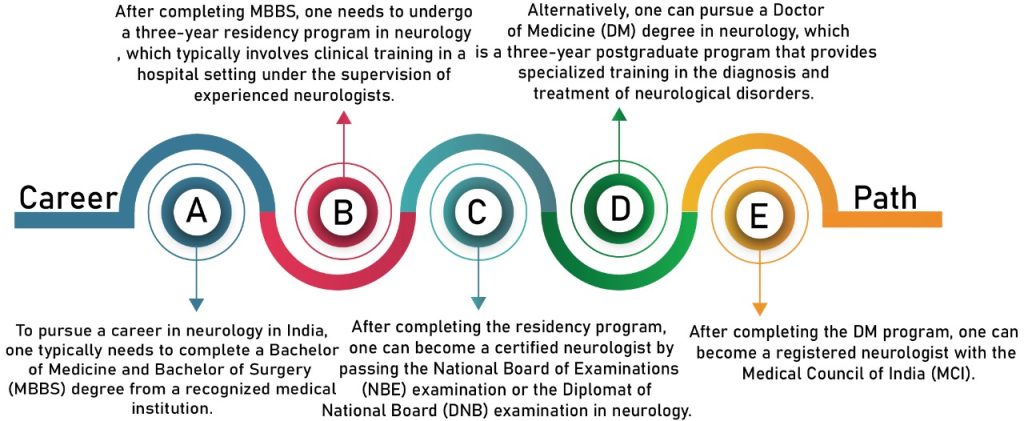Neurology is a medical specialty that deals with the study, diagnosis, and treatment of disorders related to the nervous system, including the brain, spinal cord, and peripheral nerves. Neurologists are experts in understanding the complex workings of the nervous system and use specialized techniques to diagnose and treat conditions such as epilepsy, multiple sclerosis, Parkinson’s disease, Alzheimer’s disease, and stroke. They work closely with other healthcare professionals to develop treatment plans that may involve medication, surgery, physical therapy, and other interventions.

Work description
A neurologist typically performs a thorough physical and neurological examination of a patient, including assessing their reflexes, sensation, and movement.
They may also order imaging tests, such as MRI or CT scans, and electrophysiological tests, such as EEG, to help diagnose and evaluate the patient’s condition.
Based on their assessment, neurologists may recommend various treatment options, such as medication, surgery, or physical therapy, to help manage or improve the patient’s neurological symptoms.
They may also work with other healthcare professionals, such as neurosurgeons and physical therapists, to provide comprehensive care for their patients.
High Demand
The field of neurology is constantly evolving and offers opportunities for ongoing learning and development.
Lucrative salaries
Neurologists have the potential to make a significant impact on patients’ lives by helping to diagnose and treat complex neurological conditions.
Opportunities for innovation
Neurology is a well-respected and financially rewarding medical specialty.
Versatility
Neurologists often work in a collaborative environment, with opportunities to collaborate with other healthcare professionals, including neurosurgeons, physical therapists, and psychiatrists.
Flexibility
The chance to work with other professionals in collaborative, team-based environments.
Job satisfaction
The potential to specialize in areas such as sustainable design, structural engineering, or building systems design.
High stress
The training required to become a neurologist is long and rigorous, typically involving many years of undergraduate and medical education, as well as a residency and potentially a fellowship.
Long hours
Neurologists may encounter patients with serious and often debilitating conditions, which can be emotionally challenging.
Competitive field
Neurologists may encounter patients with serious and often debilitating conditions, which can be emotionally challenging.
Constant learning
Neurology may involve long working hours and being on-call for emergencies, which can lead to a challenging work-life balance.
Isolation
The need to stay up-to-date with evolving technologies and industry trends, which may require ongoing education and training.
Eye strain and other physical health issues
The potential for competition for jobs, particularly in areas with high demand for architectural engineering services.
The cost of pursuing a career in neurology in India can vary depending on several factors, such as the institution and the duration of the program. Aspiring neurologists typically need to complete a Bachelor of Medicine and Bachelor of Surgery (MBBS) degree, which can cost between INR 4-30 lakhs depending on the institution. After completing MBBS, a candidate needs to undergo a three-year residency in neurology, which can cost around INR 10-15 lakhs. Additionally, there may be expenses related to books, equipment, and other supplies. Overall, pursuing a career in neurology in India can be a significant financial investment, but it can also offer the potential for a financially rewarding and fulfilling career.
[wpcharts type=”horizontalbarchart” bgcolor=”red:gray:yellow,blue:gray:yellow,random:gray:yellow,purple:gray:yellow” min=”0″ legend=”true” titles=”2 year , 5 year” values=”3,7,5,12″]
The earning potential of a neurologist in India can vary depending on several factors, such as the type of institution they work for, their level of experience, and their geographic location.
On average, a neurologist in India can expect to earn between INR 8-30 lakhs per annum, with those working in private hospitals or clinics typically earning more than those in government hospitals.
The earning potential can increase significantly for those who establish their own private practice or specialize in a particular area of neurology.
Additionally, those with advanced training and experience may be able to earn higher salaries or take on leadership roles in hospitals or academic institutions. Overall, neurology can be a financially rewarding career in India, but the earning potential can vary depending on individual circumstances.
[wpcharts type=”horizontalbarchart” bgcolor=”red:gray:yellow,blue:gray:yellow,random:gray:yellow,purple:gray:yellow” min=”0″ legend=”false” titles=”Entry-Level, Mid-Career, Senior-Level ” values=”5,15,25,35,45,55″]
Strong analytical and diagnostic skills.
Good communication skills.
Attention to detail and a methodical approach.
Strong problem-solving skills.
Emotional resilience to cope with the demands of the job, including long hours, challenging cases, and patient suffering.
Empathy and compassion to connect with patients.
A lifelong commitment to learning and staying up-to-date with the latest developments in the field.
Difficulty coping with the emotional and physical demands of the job.
Struggles with the analytical and diagnostic skills
Poor communication skills.
Lack of attention to detail.
Difficulty managing stress and anxiety.
Limited interest or motivation to continue learning and staying up-to-date with the latest developments in the field.
A lack of attention to detail, which can lead to errors and safety issues in designs.
Work-life balance
As a neurologist, work-life balance can be challenging due to the demanding nature of the job. On average, neurologists work long hours, often requiring early mornings, late nights, and weekend shifts. They must also stay up-to-date with the latest research and advancements in their field. However, many neurologists find ways to achieve work-life balance by prioritizing self-care, setting boundaries, and making time for their personal lives outside of work. This may include exercise, spending time with family and friends, pursuing hobbies, and taking time off when needed. Effective time management and delegation can also help neurologists maintain a healthy balance between their professional and personal lives.

Providing medical care to individuals with neurological conditions such as stroke, epilepsy, Parkinson’s disease, Alzheimer’s disease, and multiple sclerosis.
Providing medical care to individuals with neurological conditions such as stroke, epilepsy, Parkinson’s disease, Alzheimer’s disease, and multiple sclerosis.
Developing and implementing new treatments and technologies to improve patient outcomes.
Providing education and training to medical students and other healthcare professionals.
Collaborating with other medical specialties and healthcare providers to provide comprehensive care for patients with complex medical conditions.
Contributing to public health initiatives and policy decisions related to neurological disorders.
Neuro physiology
the study of the electrical activity in the nervous system.
Neuro psychology
the study of the relationship between the brain and behavior.
Neuro imaging
the use of imaging technologies to diagnose and monitor neurological conditions.
Neuro genetics
the study of genetic factors in neurological disorders.
Neuro oncology
the diagnosis and treatment of brain and spinal cord tumors.
Conclusion:
In conclusion, neurology is a fascinating and rewarding career choice for those interested in the study and treatment of the nervous system and its disorders. Neurologists play a critical role in improving patient outcomes, advancing medical knowledge, and contributing to public health initiatives. While the field of neurology can be challenging and demanding, it also offers opportunities for personal and professional growth, collaboration with other healthcare professionals, and innovation in the healthcare industry. As our understanding of the nervous system continues to evolve, neurology will remain a dynamic and vital field, offering endless possibilities for those who choose to pursue it as a career.



